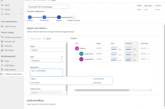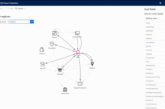The latest Microsoft business application release notes are now available in PDF or online, followed by a feature preview in February 2019 and virtual launch events and general availability in early April.
This document contains hundreds of new features for the business application suite, including the introduction of layout and remote-assisted augmented reality applications, major enhancements to the power platform, including “more innovative business and administrator requirements,” and a variety of applications.
In introducing a new wave of updates, Microsoft has taken note of the data integration capabilities of the Business Application Suite, which serves as the foundation for the “semantic consistency” of application developers.
For a rough estimate of the size, the latest release notes are 314 pages, an increase of about 20 pages from the October 2018 document. Microsoft customers and partners want to present the GA list and preview features in more detail, but then select some notable details from the suite’s applications and services. It pays attention to finances and operations. Given the multitude of different types of updates that D365FO introduces, it is advisable to review the recently released updates, such as: For example, the physical CDS integration, the availability of Chinese datasets, and the new localization.
This year’s first update describes how you can promote important product updates for all Dynamics 365 and Power Platform applications. Although the product updates mentioned in the release notes are not yet available, the preview will be available from February 2019. Once the preview is available, Microsoft will provide a Sandbox environment for Dynamics 365 users to help them explore and test the features before the update. Used for production in April.
Although a number of product updates and enhancements are planned, this blog describes the key product updates and key release dates for the features published on this blog.
PowerApps
PowerApps provides enhancements and new features in a variety of areas, including application vendors, end-user experience, management, platform capabilities, and ISV tools.
The PowerApps Control Framework enables developers and third parties to create, package, and deploy their own model-driven application controls. PCF is used for previewing model-driven applications and canvas applications.
The new application form designer CDS replaces the current application creation state, which was described in 2018 as “Removed from Dynamics CRM, redirected to PowerApps, and painted in purple. The new designer offers “significant improvements in experience”.
Dynamics 365 for Marketing
Dynamics 365 for Marketing offers a new public preview with mixed-reality content and website personalization. For example, personalization uses the properties of past behaviors to customize the landing page layout, content, and branding. Mixed Reality will provide a range of experiences tailored to the needs of a particular type of goods and services.
Marketers can add mixed-reality content to their email and marketing pages. Recipients can open such content in a desktop browser for a rich 3D experience, open augmented reality on a mobile device, or open a mixed-reality headset for a completely realistic experience. This is especially important for products that normally require tactile experience, such as: luxury goods.
Dynamics 365 Artificial Intelligence
The Market Review AI expands the availability of public previews in 138 regions.
Market Insights ‘Artificial Intelligence Wizard for Query Creation’ wants to take on the challenge of perfecting search rules in a public preview. Artificial intelligence tools use brands, products, businesses, geography, etc. to suggest the most relevant terminology for “reducing the cognitive load on search settings.”
Dynamics 365 for Sales
In Dynamics 365 for Sales, the company noted the integration of data into LinkedIn and Office 365 through integration with Microsoft Relationship Sales (MRS), sales brochure recommendations, and new configuration pricing offerings integration features designed to connect to a third-party CPQ solution were.
Team integration is universally available. The team’s D365 app enables users to collaborate directly with the Office application, collaborate with D365 users and non-users, and create documents using Office 365, which synchronizes with Dynamics 365.
In line with the sudden announcement of the end of the two OEM data service provider agreements, the retail version will provide the opportunity to discover and try out several third-party vendors.
The CPQ integration is based on a standard approach that uses the application’s Common Data Service (CDS) as a catalog to read “Dynamics 365 for Finance and Operations”.
Dynamics 365 Field Service
The Internet of Things continues to play an important role in determining the future of field service applications. The GA features in this wave include:
- Use Microsoft Flow to send the field service command payload to the device through IoT Central.
- Improved IoT visualization of alerts that require diagnostics, including case and work orders, and repair history data.
- Technicians can view IoT data for specific devices or assets, including current and historical data, through the field sales mobile app.
Dynamics 365 for Customer Service
Many notable customer service updates include:
- Dynamics 365 Portal messaging is now routed to the agent through the Omni-Channel Engagement Hub routing and work distribution system.
- The Channel Integration Framework has been officially released for the Unified Service Desk “Minimal Configuration Experience” widget.
Dynamics 365 Business Central
Productivity improvements led to the announcement of Business Central. It is expected to support more keyboard-oriented scenarios for faster usage, context-sensitive information, and advanced user interfaces for search, lists, and focus modes.
Integration with Sales has been “bolstered” (as opposed to the new, more powerful modern integration model) to provide “reliable synchronization, improved sales order integration, and insight into AI with Dynamics 365 for Sales.”
Business Central upgrades can be scheduled and rescheduled by an administrator, or an administrator can request an immediate upgrade and report bugs related to the upgrade.
Intelligent Cloud for Dynamics SMB is available for Dynamics SL 2018 CU1 and NAV 2018. GP 2018 R2 customers can copy additional data – open transaction and master record data. Historical data is supported during data replication. The replication of Dynamics NAV 2018 includes “almost all local tables,” except custom tables.
The Business Central Web API is gradually phasing out the testing phase, providing more than 48 entities offering fixed-release contracts that enable standardized integration of localization and deployment across all business centers.
Dynamics 365 for Talent
The 2019 Spring Time Framework enhancements focus on the Attract and Onboard modules as well as the advanced HR entities and some new strategies in CDS for apps. They include:
- Talent has about 20 previews for planned attract and onboard previews
- In the preview, applicants can apply to LinkedIn
- Recruiting teams can send jobs with more automation to multiple external job sites.
- Applicants can apply for a job using their LinkedIn profile
- The preparation will be faster
- Facilitate editing and effectively deleting posts across multiple websites
Dynamics 365 portal
The portal team continues to focus on making this product an external platform for all Dynamics 365 applications. This version includes:
- A new startup template that connects to the application environment CDS with no Dynamics 365 applications installed
- Support Power BI integration for access to reports and dashboards for users without a Power BI account
Flow
Microsoft has come up with some ideas, and Flow will reach more business and productivity applications than ever before, from Dynamics 365 to teams, to Power BI, OneDrive, and more. For example, in Microsoft Teams, Flow is used for notifications, interactions, and automation of commands and operations.
While Flow enables a rapid evolution in the amazing integration process, Compliance Managers may feel uncomfortable going through uncontrolled data – and beyond – the prospect of organizational control. Some corporate governance and compliance features are being set up to achieve GA, including analytics improvements, support for guest users, and prevention of organizations from relocating business data to non-business data sources and enabling the classification of data loss prevention (DLP) features.
PLAGIARISM REPORT:




